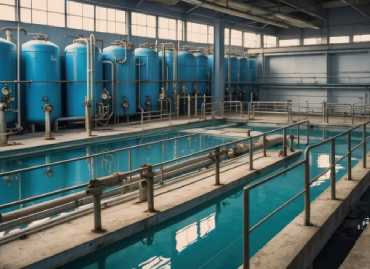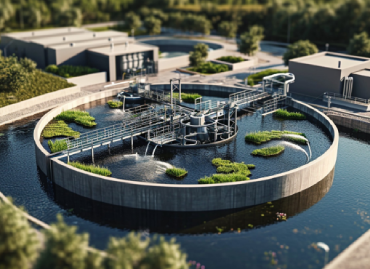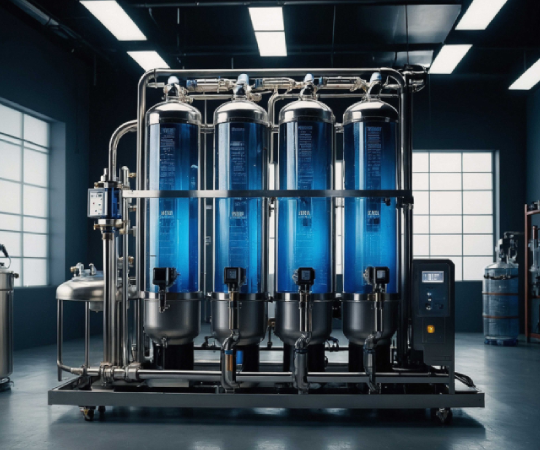- By Admin
- 22 Aug 2025
- STP Plant
Comprehensive Water Treatment and Wastewater Recycling Solutions for Municipal Gardens Using STP, ETP, RO Systems
Municipal gardens are the heart of urban green spaces, providing much-needed recreational areas, environmental benefits, and aesthetic beauty. In cities like Mumbai, Pune, and Nagpur, these gardens help combat pollution, improve air quality, and provide a retreat for city dwellers. Given the role these spaces play in enhancing biodiversity and public well-being, water management becomes a critical factor for their upkeep.
Water usage in municipal gardens goes far beyond simple irrigation. It supports various aspects of garden management, from maintaining lush lawns and vibrant plant life to sustaining decorative features like fountains and ponds. Water is also essential for public amenities like restrooms, cafes, and open spaces, which visitors frequently use. Gardens with features like playgrounds, fitness zones, and picnic areas add to the complexity of water demand. Automated irrigation systems and drip lines are commonly used to ensure efficient water distribution, especially during dry spells, but the overall water management strategy must be robust to ensure sustainability.
In urban gardens, untreated water can quickly lead to issues such as water wastage, plant stress, and unclean public spaces. This makes it critical for municipal bodies to adopt advanced water treatment systems that focus on water recycling and efficient resource management. By implementing proper water treatment solutions, municipal gardens can ease their dependence on freshwater resources and make their operations more eco-friendly and cost-efficient.
"Municipal gardens are the soul of our cities, and water is the force that keeps them alive. Effective water management ensures lush greenery, public hygiene, and sustainable urban living. Responsible use, recycling, and treatment of water resources are not just practices—they're necessities for every municipal green space to thrive."
Activities in Municipal Gardens That Regularly Contribute to Wastewater Generation
Municipal gardens generate a range of wastewater from various daily activities. The irrigation runoff often contains fertilisers, pesticides, and organic residues, which can significantly degrade the surrounding environment. Similarly, the greywater generated from public restrooms, wash basins, and drinking stations poses a treatment challenge, as it contains soaps, oils, and human waste that needs to be properly processed.
In addition to this, maintenance operations like washing benches, cleaning walkways, and washing fountains contribute to wastewater containing chemicals, cleaning agents, and particulate matter. Gardens with food courts or cafes further increase wastewater output, generating greasy discharges and organic waste. If left untreated, these waste streams can pollute nearby water bodies and degrade soil health.
Seasonal gardening practices such as mulching, pesticide application, and fertilisation also lead to increased runoff risks, introducing additional contaminants into the environment. To address these concerns, municipal gardens require localised, efficient wastewater treatment solutions that recycle water for reuse and minimise harmful environmental impacts.


Identifying Different Wastewater Types in Municipal Gardens and Their Impact on Ecosystems
The wastewater generated in municipal gardens is often a mixture of different types. Greywater, which originates from public restrooms, contains soaps, detergents, and human waste that require biological treatment methods. Runoff from irrigation systems often carries soil, pesticides, and fertilisers, which can lead to nutrient pollution and cause harm to nearby water bodies if not controlled.
Water from fountains and decorative ponds may become stagnant, supporting the growth of algae and microorganisms. Cleaning wastewater from maintenance activities, such as washing benches or walkways, may contain oils, chemicals, and debris. If not properly treated, these contaminants can harm the surrounding ecosystem, contributing to soil degradation, foul odours, and pollution. Kitchen wastewater from food courts also poses a threat due to the presence of oils, food particles, and soap residues.
Steps Municipal Gardens Take to Treat Wastewater and Comply with Environmental Standards
Municipal gardens typically implement decentralised water treatment systems that handle the wastewater generated on-site. Sewage from restrooms is treated using compact STPs (Sewage Treatment Plants), which employ primary and secondary biological treatments to remove contaminants. After treatment, the water is disinfected and can be reused for non-potable purposes like landscape irrigation or flushing toilets.
Greywater from cleaning operations and irrigation runoff is filtered and treated using oxidation methods, removing solids and organic materials. ETPs (Effluent Treatment Plants) are commonly employed in areas with food outlets to break down oils and grease before the treated water is safely discharged or reused. The sludge produced during treatment is either composted or processed further for safe disposal.
By implementing these systems, municipal gardens can ensure compliance with local pollution control standards while conserving precious freshwater resources. The treated water is often reused within the same ecosystem, allowing these green spaces to operate sustainably and reduce their overall environmental impact.
How Municipal Gardens Are Leveraging Smart Technology for Water Recycling and Wastewater Reuse
As sustainability becomes an increasing priority, many municipal gardens are adopting advanced technologies to optimise their water management strategies. Modern STPs with MBBR (Moving Bed Biofilm Reactor) and SBR (Sequential Batch Reactor) technologies are being used to treat wastewater effectively in compact, space-efficient systems. These technologies are ideal for urban gardens where space is limited, and the need for high-efficiency treatment is crucial.
Smart monitoring systems are increasingly being used to track water quality in real-time, allowing municipal garden managers to optimise water usage, detect issues quickly, and maintain compliance with environmental standards. Solar-powered pumps and automatic valves help to reduce energy consumption, making the systems more eco-friendly.
In addition, RO (Reverse Osmosis) systems are increasingly being integrated into municipal gardens to reclaim water for reuse in irrigation, cleaning, and other non-potable applications. UV disinfection units are used for final water treatment, ensuring that recycled water is safe for public use. By incorporating IoT and data analytics, municipalities can monitor and manage water treatment operations remotely, providing a more efficient, sustainable approach.
Providing Customised Water Treatment Solutions for Municipal Gardens Across Maharashtra and Urban India
Installation, and operation of STPs, ETPs, WTPs, and RO systems that are tailored to meet the specific needs of each garden. Whether managing a small community park or a large botanical garden, our modular and scalable solutions ensure cost-effective water treatment while maximising space efficiency. We also offer automation tools that enable real-time monitoring and alerts, empowering garden managers with full control over their water systems. Additionally, our team provides annual maintenance contracts and training to ensure the systems continue to operate efficiently.
By partnering with us, municipalities across Maharashtra and urban India can enhance the management of their green spaces, improve sustainability practices, and reduce their environmental footprint. Our solutions support the long-term health and vibrancy of municipal gardens while conserving precious water resources for the future.
Summary And Conclusion
Municipal gardens play a vital role in urban environments, enhancing public spaces and improving air quality. Efficient water and wastewater management systems are essential for maintaining these green spaces sustainably. By using advanced technologies like STPs, ETPs, WTPs, and RO systems, municipal gardens can recycle water for irrigation, cleaning, and other non-potable uses. Smart monitoring and automation ensure optimal performance while reducing environmental impact. Our tailored water treatment solutions help municipalities conserve water, ensure compliance with environmental standards, and maintain lush, vibrant gardens that contribute to a greener, healthier urban environment.































































